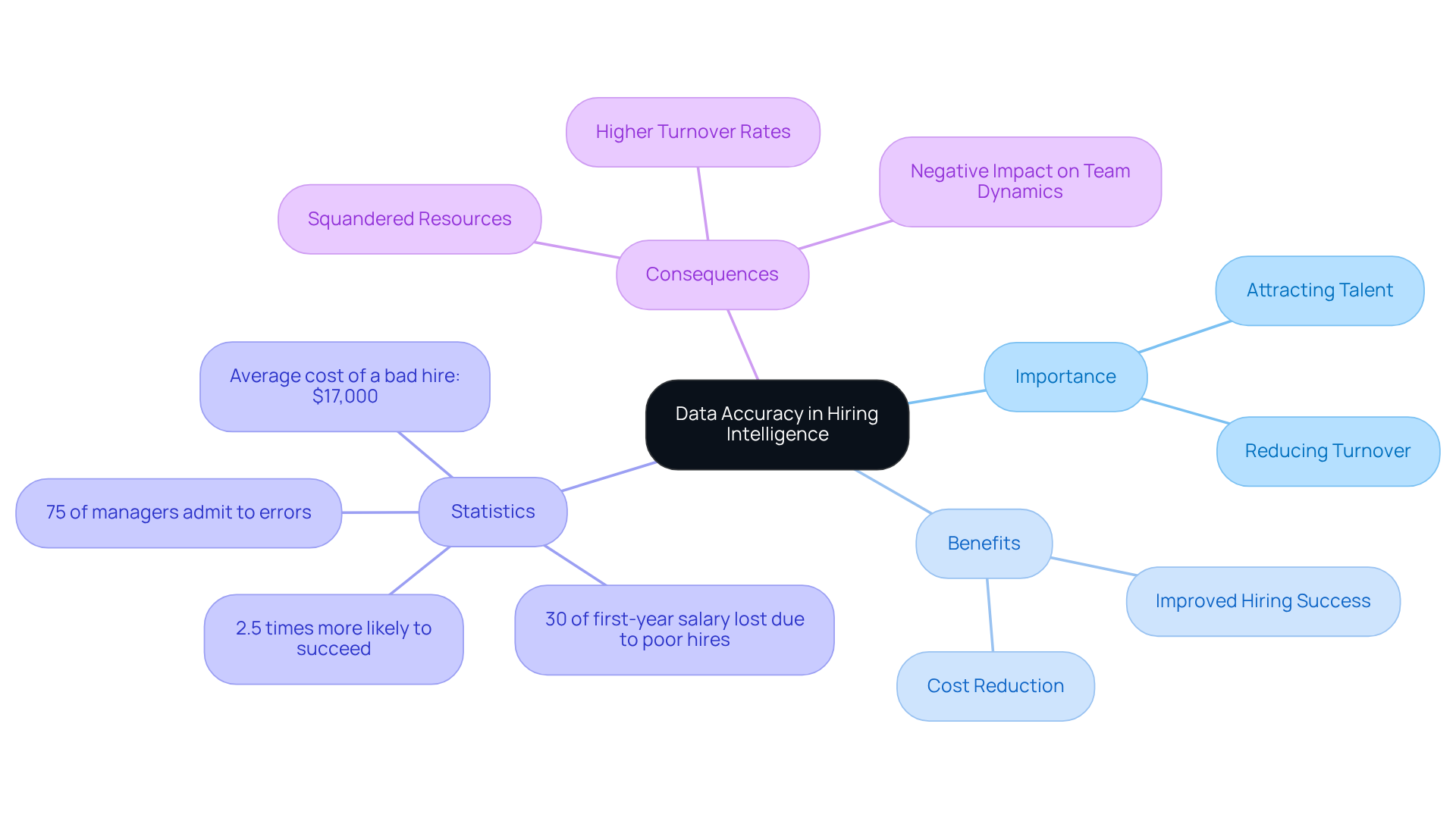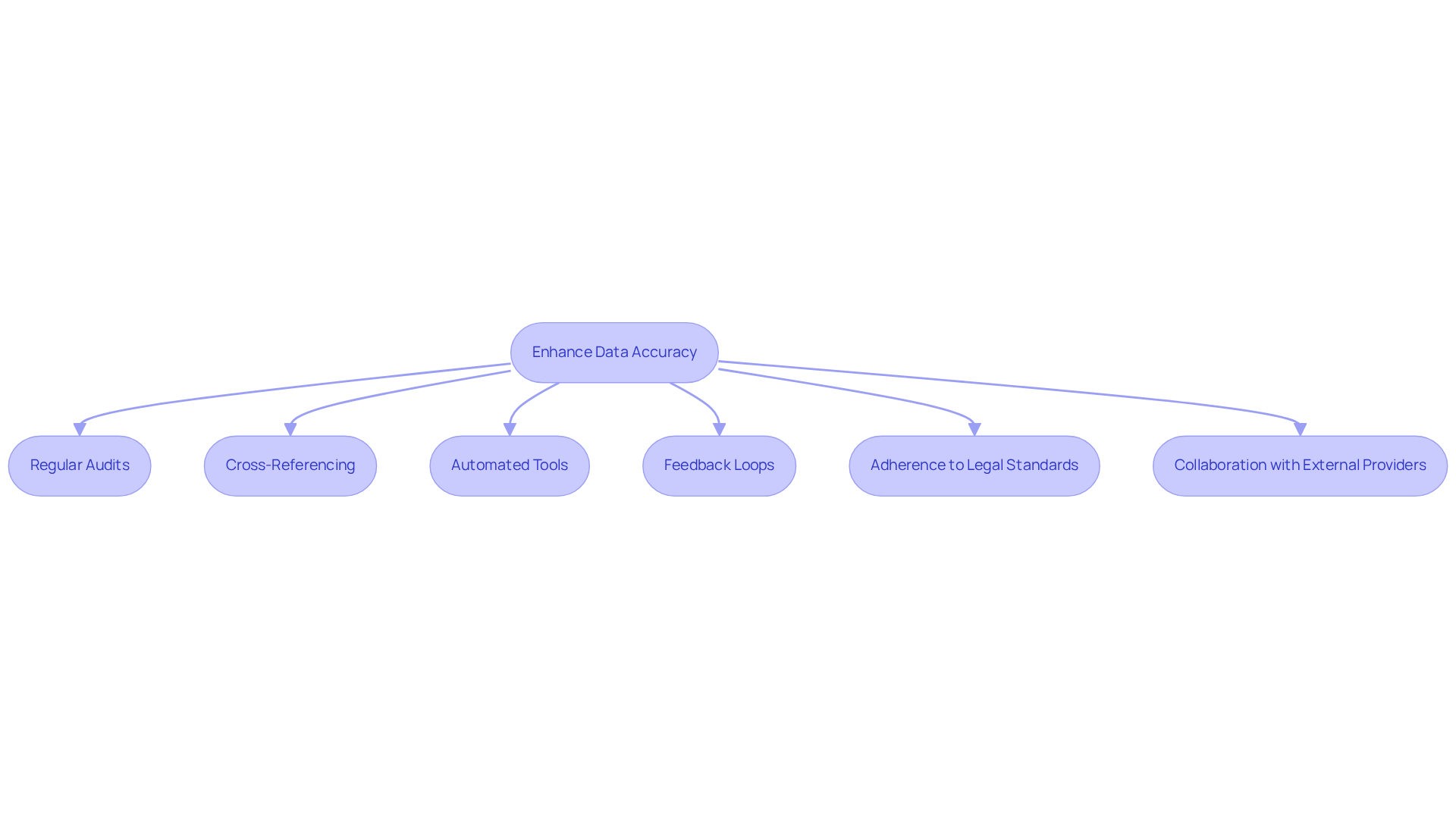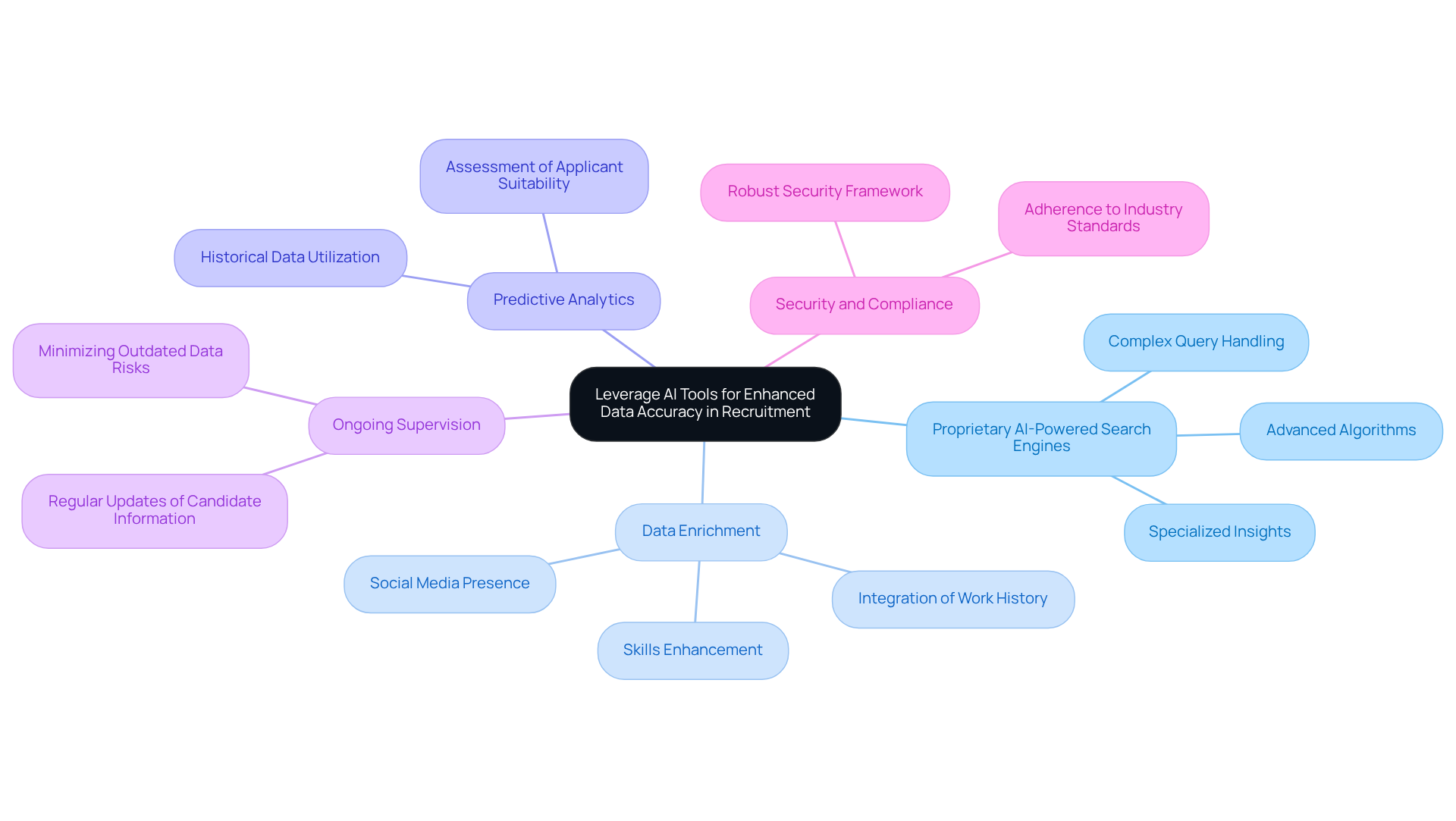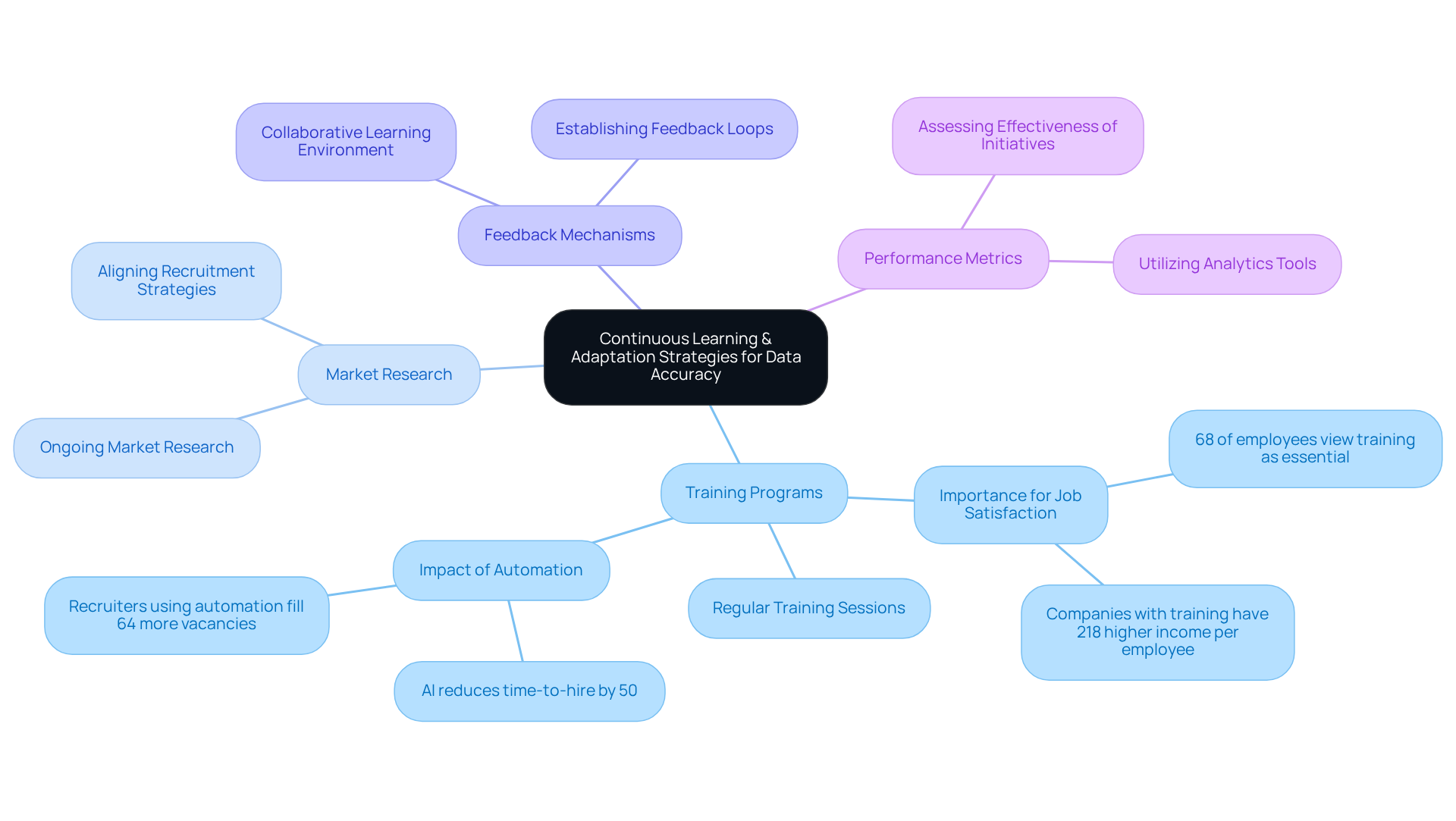Overview
Data accuracy in hiring intelligence APIs is not just important; it is essential for organizational success. Companies that prioritize accurate information experience a remarkable increase in their recruitment effectiveness. Statistics reveal that high-quality data can lead to a 2.5 times higher success rate in hires. Moreover, it helps mitigate the considerable costs associated with poor recruitment decisions. This underscores the urgent need for robust data verification and validation practices.
In today's competitive landscape, organizations must recognize that the foundation of successful hiring lies in the integrity of their data. By implementing effective data practices, they can significantly enhance their recruitment outcomes. The evidence is clear: accurate data is a game-changer in the hiring process.
Introduction
Data accuracy is crucial in the recruitment landscape, where organizations compete fiercely to secure top talent. Flawed information can lead to costly hiring mistakes and increased turnover rates, making it imperative for businesses to refine their recruitment processes. How can companies leverage proven APIs to enhance data accuracy and transform their hiring intelligence? This article explores best practices, innovative AI tools, and continuous improvement strategies that can revolutionize recruitment outcomes. By doing so, organizations can not only attract the right candidates but also optimize their hiring investments.
Understand the Importance of Data Accuracy in Hiring Intelligence
[Data accuracy in hiring intelligence APIs](https://docs.exa.ai/websets/api/overview) is essential for organizations aiming to attract and retain top talent. Flawed information can lead to suboptimal recruitment choices, higher turnover rates, and squandered resources. Companies that utilize high-quality information in their recruitment processes are 2.5 times more likely to achieve successful hires. This statistic underscores the critical need to emphasize , which allows organizations to efficiently focus on suitable candidates and thereby improve overall recruitment success rates.
Moreover, the data accuracy in hiring intelligence APIs provides valuable insights into market trends and applicant behavior, enabling recruiters to enhance their strategies. Organizations leveraging Websets' AI-driven talent discovery and qualification solutions have reported significant improvements in their recruitment outcomes. By employing precise lead generation techniques, teams can identify qualified candidates filtered by skills, experience, and location, ensuring a better match for open positions.
Case studies reveal that organizations that prioritize data accuracy in hiring intelligence APIs not only enhance their selection results but also reduce the costs associated with poor hires, which can average around $17,000 per incident. Furthermore, companies can lose up to 30% of an employee's first-year salary due to a poor recruitment decision, highlighting the financial implications of hiring mistakes. Alarmingly, 75% of recruitment managers admit to making at least one poor choice, highlighting the prevalence of employment errors and the urgent need for data accuracy in hiring intelligence APIs.
By concentrating on information quality and utilizing Websets' advanced tools, including market research capabilities, companies can mitigate risks and foster a more efficient hiring process.

Implement Best Practices for Data Verification and Validation
To enhance , organizations must adopt a systematic approach to verification and validation.
- Regular Audits are crucial; conducting periodic audits of applicant databases not only identifies inaccuracies but also rectifies them. Organizations that implement regular audits experience a notable boost in information reliability, with studies indicating a potential 30% increase in the precision of applicant details.
- Cross-Referencing is another vital practice. By utilizing multiple sources—such as LinkedIn profiles, professional websites, and industry databases—organizations can obtain a comprehensive view of each candidate's qualifications.
- Additionally, Automated Tools play a significant role. The adoption of automated information validation tools can efficiently flag inconsistencies and outdated details, streamlining the verification process. Companies using these tools have reported a reduction in inconsistencies by up to 25%.
- Furthermore, establishing Feedback Loops is essential. By creating systems where recruitment managers can report inconsistencies in candidate information, organizations foster ongoing enhancement and improve the overall quality of their databases.
- Adherence to legal and regulatory standards is also paramount for background screening providers, ensuring that data accuracy in hiring intelligence APIs is upheld throughout the recruitment process.
- Collaborating with external providers, such as Reference Services, Inc., can further bolster verification efforts, offering scalable solutions and industry expertise.
By implementing these optimal methods, companies can significantly mitigate the risks associated with erroneous information in their recruitment procedures.

Leverage AI Tools for Enhanced Data Accuracy in Recruitment
AI tools are revolutionizing data accuracy in hiring intelligence APIs, enabling organizations to significantly enhance their recruitment processes. Consider these key strategies:
- Proprietary AI-Powered Search Engines: Platforms like Websets leverage advanced algorithms and a proprietary search engine designed for complex queries. This ensures that only the most pertinent individuals are identified, streamlining the sourcing process. Websets' enable it to uncover specialized individuals and insights that other tools may overlook.
- Data Enrichment: Websets enhances applicant profiles by integrating additional information such as work history, skills, and social media presence. This holistic view of potential hires is crucial for targeted recruitment efforts.
- Predictive Analytics: By utilizing predictive analytics, organizations can assess applicant suitability based on historical recruitment data, thereby enhancing the chances of successful placements.
- Ongoing Supervision: Implementing AI systems that consistently refresh candidate information ensures that databases remain current and precise, minimizing the risk of outdated information impacting recruitment decisions.
- Security and Compliance: Websets maintains a robust security framework and adheres to industry standards, ensuring that all processing agreements are prepared for enterprise clients.
By integrating these AI-driven approaches, companies can enhance their recruitment strategies, which will improve data accuracy in hiring intelligence APIs and lead to more informed and effective hiring outcomes.

Adopt Continuous Learning and Adaptation Strategies for Data Accuracy
To achieve and sustain high levels of information accuracy, organizations must cultivate a culture of continuous learning and adaptation. This can be effectively accomplished through several key strategies:
- Training Programs: Regular training sessions for recruitment teams focused on the latest information management practices and tools, including , are essential. This ensures team members are well-prepared to manage information accurately, which is vital considering that 68% of employees regard training as necessary for job satisfaction. Furthermore, companies with comprehensive employee training programs experience 218% higher income per employee than those without formalized training, underscoring the financial benefits of investing in training.
- Market Research: Ongoing market research is crucial to remain informed about industry trends and candidate expectations. This proactive approach enables timely adjustments in recruitment strategies, ensuring alignment with evolving market demands.
- Feedback Mechanisms: Establishing feedback loops where recruiters can share insights and experiences fosters a collaborative learning environment, enhancing the team's ability to adapt and refine information handling procedures.
- Performance Metrics: Metrics should be created to assess the effectiveness of information accuracy initiatives. By measuring outcomes, organizations can identify areas for improvement and refine their strategies accordingly, potentially utilizing Websets' analytics tools to track performance.
Organizations that prioritize continuous learning not only enhance data accuracy in hiring intelligence APIs but also improve overall recruitment outcomes. For instance, recruiters who utilize automation in their processes fill 64% more vacancies than those who do not, demonstrating the significant impact of training on the adoption of automation tools. By embracing these strategies, particularly those supported by Websets' innovative technologies, recruitment teams can remain competitive and responsive in a rapidly changing landscape.

Conclusion
Data accuracy in hiring intelligence is not merely a technical requirement; it is a fundamental aspect that can determine the success of an organization’s recruitment efforts. By prioritizing the integrity of data through proven APIs and advanced technologies, companies can significantly enhance their ability to attract and retain top talent. The emphasis on accurate information leads to better hiring decisions, reduced turnover, and ultimately, a more productive workforce.
Several critical strategies for achieving high data accuracy in recruitment processes are essential for organizations:
- Regular audits
- Cross-referencing candidate information
- Use of automated tools
Additionally, leveraging AI technologies for data enrichment and predictive analytics can further streamline hiring efforts. Continuous learning and adaptation within recruitment teams are vital for maintaining data integrity, ensuring organizations remain responsive to market changes and candidate needs.
The importance of data accuracy in hiring intelligence cannot be overstated. Organizations must take proactive steps to implement best practices and leverage innovative tools to improve their recruitment outcomes. By fostering a culture of continuous improvement and utilizing advanced technologies, businesses can not only enhance their hiring processes but also secure a competitive edge in the talent marketplace. Embracing these strategies is crucial for any organization looking to thrive in today’s dynamic employment landscape.
Frequently Asked Questions
Why is data accuracy important in hiring intelligence?
Data accuracy is crucial in hiring intelligence as it helps organizations attract and retain top talent. Flawed information can lead to poor recruitment choices, higher turnover rates, and wasted resources.
How does data accuracy affect recruitment success rates?
Companies that utilize high-quality information in their recruitment processes are 2.5 times more likely to achieve successful hires, emphasizing the importance of data accuracy.
What insights can data accuracy in hiring intelligence provide?
Accurate data can offer valuable insights into market trends and applicant behavior, enabling recruiters to enhance their recruitment strategies.
What improvements have organizations seen by using accurate data in hiring?
Organizations leveraging AI-driven talent discovery and qualification solutions, like those from Websets, have reported significant improvements in their recruitment outcomes.
How can precise lead generation techniques help in recruitment?
Precise lead generation techniques allow teams to identify qualified candidates based on skills, experience, and location, ensuring a better match for open positions.
What are the financial implications of poor hiring decisions?
Poor hires can cost companies an average of $17,000 per incident and potentially lead to a loss of up to 30% of an employee's first-year salary.
How common are poor hiring decisions among recruitment managers?
Alarmingly, 75% of recruitment managers admit to making at least one poor hiring choice, highlighting the prevalence of employment errors.
What strategies can companies use to mitigate hiring risks?
By focusing on information quality and utilizing advanced tools like market research capabilities, companies can reduce hiring risks and improve the efficiency of their hiring processes.




